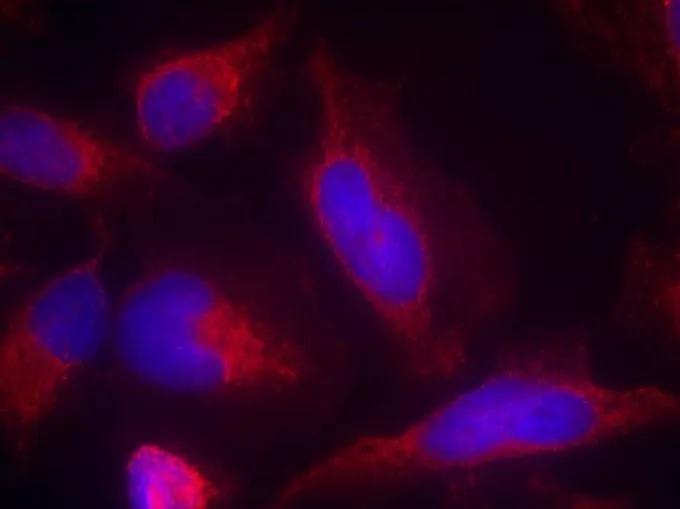![ELISA analysis of antigen using GTX60777 FLT3 antibody [7B7C3]. Black : Control antigen 100ng Purple : Antigen 10ng Blue : Antigen 50ng Red : Antigen 100ng ELISA analysis of antigen using GTX60777 FLT3 antibody [7B7C3]. Black : Control antigen 100ng Purple : Antigen 10ng Blue : Antigen 50ng Red : Antigen 100ng](https://www.genetex.com/upload/website/prouct_img/normal/GTX60777/GTX60777_20170912_ELISA_w_23061123_653.webp)
ELISA analysis of antigen using GTX60777 FLT3 antibody [7B7C3]. Black : Control antigen 100ng Purple : Antigen 10ng Blue : Antigen 50ng Red : Antigen 100ng
FLT3 antibody [7B7C3]
GTX60777
ApplicationsWestern Blot, ELISA, ImmunoHistoChemistry, ImmunoHistoChemistry Paraffin
Product group Antibodies
TargetFLT3
Overview
- SupplierGeneTex
- Product NameFLT3 antibody [7B7C3]
- Delivery Days Customer9
- Application Supplier NoteWB: 1/500 - 1/2000. IHC-P: 1/200 - 1/1000. ELISA: 1/10000. *Optimal dilutions/concentrations should be determined by the researcher.Not tested in other applications.
- ApplicationsWestern Blot, ELISA, ImmunoHistoChemistry, ImmunoHistoChemistry Paraffin
- CertificationResearch Use Only
- ClonalityMonoclonal
- Clone ID7B7C3
- Concentration1 mg/ml
- ConjugateUnconjugated
- Gene ID2322
- Target nameFLT3
- Target descriptionfms related receptor tyrosine kinase 3
- Target synonymsCD135, FLK-2, FLK2, STK1, receptor-type tyrosine-protein kinase FLT3, CD135 antigen, FL cytokine receptor, fetal liver kinase 2, fms related tyrosine kinase 3, fms-like tyrosine kinase 3, growth factor receptor tyrosine kinase type III, stem cell tyrosine kinase 1
- HostMouse
- IsotypeIgG1
- Protein IDP36888
- Protein NameReceptor-type tyrosine-protein kinase FLT3
- Scientific DescriptionThis gene encodes a class III receptor tyrosine kinase that regulates hematopoiesis. This receptor is activated by binding of the fms-related tyrosine kinase 3 ligand to the extracellular domain, which induces homodimer formation in the plasma membrane leading to autophosphorylation of the receptor. The activated receptor kinase subsequently phosphorylates and activates multiple cytoplasmic effector molecules in pathways involved in apoptosis, proliferation, and differentiation of hematopoietic cells in bone marrow. Mutations that result in the constitutive activation of this receptor result in acute myeloid leukemia and acute lymphoblastic leukemia. [provided by RefSeq, Jan 2015]
- Storage Instruction-20°C or -80°C,2°C to 8°C
- UNSPSC12352203

![IHC-P analysis of liver cancer tissue using GTX60777 FLT3 antibody [7B7C3]. IHC-P analysis of liver cancer tissue using GTX60777 FLT3 antibody [7B7C3].](https://www.genetex.com/upload/website/prouct_img/normal/GTX60777/GTX60777_20170912_IHC-P_1_w_23061123_907.webp)
![IHC-P analysis of cervical cancer tissue using GTX60777 FLT3 antibody [7B7C3]. IHC-P analysis of cervical cancer tissue using GTX60777 FLT3 antibody [7B7C3].](https://www.genetex.com/upload/website/prouct_img/normal/GTX60777/GTX60777_20170912_IHC-P_w_23061123_283.webp)
![WB analysis of human FLT3 recombinant protein using GTX60777 FLT3 antibody [7B7C3]. WB analysis of human FLT3 recombinant protein using GTX60777 FLT3 antibody [7B7C3].](https://www.genetex.com/upload/website/prouct_img/normal/GTX60777/GTX60777_20170912_WB_w_23061123_177.webp)

![WB analysis of Baf3 cells untreated or treated with FLT3 ligand using GTX36299 FLT3 (phospho Tyr969) antibody [T.602.6] (upper panel) or FLT3 antibody (lower panel).](https://www.genetex.com/upload/website/prouct_img/normal/GTX36299/GTX36299_1857_WB_w_23060819_603.webp)

![WB analysis of human placenta tissue lysate using GTX52747 FLT3 antibody [9G23].](https://www.genetex.com/upload/website/prouct_img/normal/GTX52747/GTX52747_20191119_WB_w_23060900_543.webp)